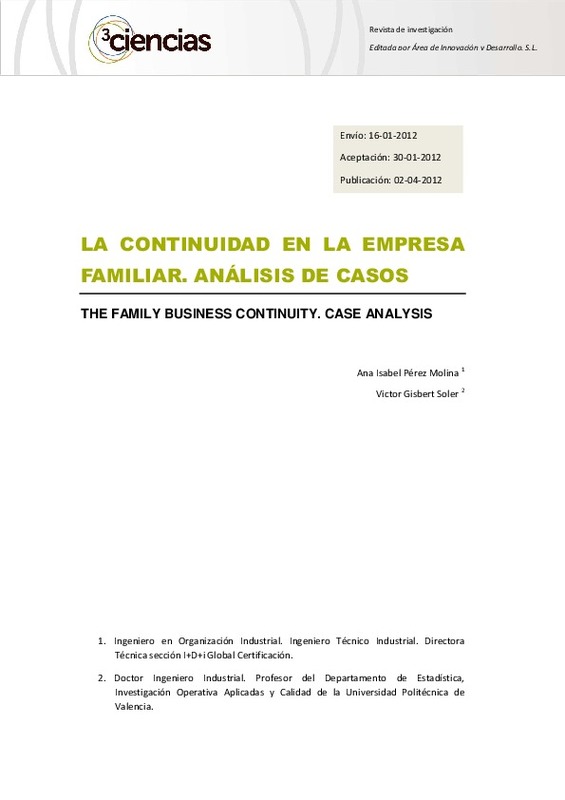JavaScript is disabled for your browser. Some features of this site may not work without it.
Buscar en RiuNet
Listar
Mi cuenta
Estadísticas
Ayuda RiuNet
Admin. UPV
La continuidad en la empresa familiar. Análisis de casos
Mostrar el registro sencillo del ítem
Ficheros en el ítem
| dc.contributor.author | Pérez Molina, Ana Isabel
|
es_ES |
| dc.contributor.author | Gisbert Soler, Víctor
|
es_ES |
| dc.date.accessioned | 2013-12-09T08:16:39Z | |
| dc.date.available | 2013-12-09T08:16:39Z | |
| dc.date.issued | 2012 | |
| dc.identifier.issn | 2254-3376 | |
| dc.identifier.uri | http://hdl.handle.net/10251/34345 | |
| dc.description.abstract | [EN] The principal aim of this investigation is to carry out an exhibition on the reasons of the problems in the family enterprises and the possible tools to solve the above mentioned conflicts. Between the most important problems of the family enterprises stand out the problems derived from the functioning of the organization (confuse family and professional flows, don¿t motivation, absent of growth,¿) and the problems relative to the succession (taxes, selection of the leader, resistance to the change,¿). The tools most adapted to diminish the problems of the family enterprises give importance to the human factor of the organizations and try to adapt the functions and the responsibilities of all the workers. It is basic to realize the plan of succession, to elaborate a family protocol, to manage the heritance, and to increase the professionalization of the company. | es_ES |
| dc.description.abstract | [ES] El objetivo principal de esta investigación es llevar a cabo una exposición sobre las causas de los problemas en las empresas familiares y las posibles herramientas para solucionar dichos conflictos. Entre los problemas más importantes de las empresas familiares destacan los problemas derivados del funcionamiento de la organización (confundir flujos familiares y profesionales, desmotivación, falta de crecimiento,¿) y los problemas relativos a la sucesión (impuestos, selección del líder, resistencia al cambio,...). Las herramientas más adecuadas para disminuir los problemas de las empresas familiares dan importancia al factor humano de las organizaciones y tratan de adecuar las funciones y las responsabilidades de todos los trabajadores. Es básico realizar el plan de sucesión, elaborar un protocolo familiar, gestionar la herencia, y aumentar la profesionalización de la empresa. | es_ES |
| dc.language | Español | es_ES |
| dc.publisher | Area de Innovación y Desarrollo S.L | es_ES |
| dc.relation.ispartof | 3C Empresa, Investigación y pensamiento crítico | es_ES |
| dc.rights | Reserva de todos los derechos | es_ES |
| dc.subject | Family enterprise | es_ES |
| dc.subject | Professionalism level | es_ES |
| dc.subject | Generational change | es_ES |
| dc.subject | Family protocol | es_ES |
| dc.subject | Empresa familiar | es_ES |
| dc.subject | Nivel de profesionalización | es_ES |
| dc.subject | Cambio generacional | es_ES |
| dc.subject | Protocolo familiar | es_ES |
| dc.subject.classification | ESTADISTICA E INVESTIGACION OPERATIVA | es_ES |
| dc.title | La continuidad en la empresa familiar. Análisis de casos | es_ES |
| dc.title.alternative | The family business continuity. Case analysis | es_ES |
| dc.type | Artículo | es_ES |
| dc.rights.accessRights | Abierto | es_ES |
| dc.contributor.affiliation | Universitat Politècnica de València. Departamento de Estadística e Investigación Operativa Aplicadas y Calidad - Departament d'Estadística i Investigació Operativa Aplicades i Qualitat | es_ES |
| dc.description.bibliographicCitation | Pérez Molina, AI.; Gisbert Soler, V. (2012). La continuidad en la empresa familiar. Análisis de casos. 3C Empresa, Investigación y pensamiento crítico. (1):7-23. http://hdl.handle.net/10251/34345 | es_ES |
| dc.description.accrualMethod | S | es_ES |
| dc.relation.publisherversion | http://www.3ciencias.com/articulos/articulo/la-continuidad-en-la-ef-analisis-de-casos/ | es_ES |
| dc.description.upvformatpinicio | 7 | es_ES |
| dc.description.upvformatpfin | 23 | es_ES |
| dc.type.version | info:eu-repo/semantics/publishedVersion | es_ES |
| dc.description.issue | 1 | es_ES |
| dc.relation.senia | 240979 |






